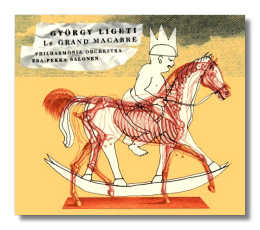
The Internet's Premier Classical Music Source
Related Links
- Ligeti Reviews
- Latest Reviews
- More Reviews
-
By Composer
-
Collections
DVD & Blu-ray
Books
Concert Reviews
Articles/Interviews
Software
Audio
Search Amazon
Recommended Links
Site News
 CD Review
CD Review
György Ligeti

Le Grand Macabre (1997 version)
- Willard White (Nekrotzar)
- Derek Lee Ragin (Prince Go-Go)
- Graham Clark (Piet the Pot)
- Jard van Nes (Mescalina)
- Frode Olsen (Astradamors)
- Sibylle Ehlert (Venus, Gepopo)
- Laura Claycomb (Amanda)
- Charlotte Hellekant (Amando)
- Steven Cole (White Minister)
- Richard Suart (Black Minister); others
London Sinfonietta Voices
Philharmonia Orchestra/Esa-Pekka Salonen
Sony Classical S2K62312 DDD 2CDs 43:12, 59:15
I don't think György Ligeti has written anything more calculated to enrage and bemuse than Le Grand Macabre, an opera that portrays everything from S&M and nymphomania to infantilism and a failed apocalypse. The subject matter is matched by the outrageous libretto, which includes long passages in which characters hurl absurd insults at each other ("Piddlepants!" "Pimply ponce!"). Then there's the music. The opera opens with a Prélude for an ensemble of car horns (take that, George Gershwin), topped only by a Prélude for doorbells that opens the third scene. The singers bellow, boom, and shriek at each other in the extremes of their ranges. There might be some deep, philosophical meaning to all of this, but to me, Le Grand Macabre seems to be Ligeti's big experiment in Dada – something not meant to be be taken too seriously, possibly even something designed to scandalize the bourgeoisie.
The opera was recorded more than ten years ago for Wergo (6170-2). However, since then, the composer has seen many performances of his work, and, based on his observations, he has revised it in many significant ways. This is the first recording of the 1997 version, and the two versions are so different that no one at all interested in Ligeti's work will be able to bear being without the Sony discs. Material has been cut and added, sung lines have been made into spoken lines, and vice-versa. Overall, there is less talking than there was before. The composer has described the difference as one not dissimilar to the difference between a singspiel and an opera.
Another major change is that this recording is sung in English. (The Wergo performance is sung in German.) This takes nothing away from the opera, and of course that is good news for English-speaking listeners. This recording was made in the Châtelet Theater in Paris during the course of several live performances that took place in February of 1998. Occasional audience reactions – mostly laughter – can be heard, but one wonders what the Parisians thought about all of this. (The production was designed by Peter Sellars, so it probably looked just as weird as it sounds.)
The singers rise to the challenge. Sibylle Ehlert, who must reside in the stratospheres as she depicts both the Goddess of Love and a chief of the Secret Police (who disguises "himself" as both a bird of prey and a spider), is particularly impressive. Jard van Nes throws herself into the slatternly role of Mescalina, and Laura Claycomb and Charlotte Hellekant excel in the score's most lyrical moments as the lovers, Amanda and Amando, who can't keep their hands off each other. (Their original names were Spermando and Clitoria.) Among the men, countertenor Derek Lee Ragin offers surreal vocal thrills as the babyish Prince Go-go, and bass-baritone Willard White cuts a ridiculous and ultimately pathetic figure as Nekrotzar, the Death-like figure whose plans for the end of the world go awry when he gets drunk on too much wine. Steven Cole and Richard Suart relish the insults they hurl at each other as the Prince's abusive ministers, and tenor Graham Clark adds appropriate Cockney irony to his role as Piet the Pot, the unfortunate soul who has to carry Nekrotzar around on his back. Poor Frode Olsen; on stage, he got to be in drag as he was whipped and tortured by Jard van Nes. He faces this with vocal equanimity. Expert choral assistance is provided by the London Sinfonietta Voices, under the direction of Grant Gershon and Terry Edwards.
Conductor Salonen is usually at home in modern classical music, and he directs the incredible traffic in Le Grand Macabre with passion and precision. I can hardly wait for him to get to the orchestral scores, as I assume he will in good time. This is Volume 8 in Sony's Ligeti Edition, a series which is projected to extend to several more volumes, and which has the composer's imprimatur.
In spite of my efforts, indescribable!
Copyright © 1999, Raymond Tuttle


















